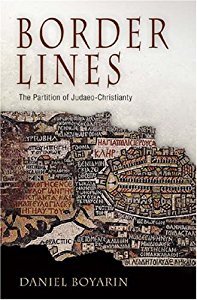Warning. Dr Larry Hurtado and others embracing a similar perspective disagree strongly with the views of the scholar to be discussed in this post. I will address some of Hurtado’s criticisms of Dr Daniel Boyarin at a later date. But now you know that what I am covering here is not a consensus view. But it offers ideas that deserve exploring and thinking through, whatever position we arrive at in the end.
I am sure I am not alone in having wondered at some time how it can be that Roman authorities, as we are told, could not easily tell Christians apart from Jews in the early days. One group was dominated by those who worshiped Jesus and did not keep the Jewish customs and the other by those who cursed Jesus and did keep the Jewish customs. So when in Acts we read of authorities being prepared to dismiss complaints of either party because they thought the issue was merely over legalistic quibbles, something does not sound quite right — or “coherent”, as a scholar interested in criteria of authenticity might say. Something’s missing from this equation.
The Long Good-Bye
Recently I finished reading Tom Holland’s In the Shadow of the Sword. He makes the point Christianity and Judaism as we understand them did not really come into their own, that is, separate as truly distinct religions until the fourth century. (He cites scholarly works, of course.) What led to that clear demarcation between the two as opposing religions was the work of the heresiologists on both sides. There arose a situation where it became necessary for Christians who had achieved some political power and status to draw clear boundaries to define who was ‘in’ and who was ‘out’. Jewish authorities were correspondingly obliged to do the same.
I am in the early stages of reading Daniel Boyarin’s Border Lines: The Partition of Judaeo-Christianity. Fate must have led me to this book just after reading Tom Holland’s because Boyarin expresses the very same view of the late definitive separation between the two religions. (I don’t really believe in Fate, by the way.) As would be expected given the different themes of the two books, Boyarin goes into more detail than Holland to make his case. He addresses the long-established conservative view that the final break between the two happened after the first Jewish War, or certainly no later than the second in the 130s.

The real meaning of the Pella legend?
One of his interesting points is made in relation to the legend of the early Church fleeing to Pella. That has often been interpreted as the final breach between Christianity and Judaism. The Jerusalem Church fled the city to escape the imminent conquest of the city by the Romans. Eusebius even links this with a heavenly voice heard in the Temple saying “Let us remove hence!” (Quaint translation of “Armaggedon outta here”.) Later Ebion was believed to have arisen from among these Christians and founded the “Ebionites” — Jewish Christians who had truly separated themselves from Judaism.
Boyarin puts a fly in the ointment of the legend that this event might be interpreted as the final rift between Judaism and Christianity. Continue reading “Why Christians and Jews were for so long indistinguishable — even after the flight to Pella”

